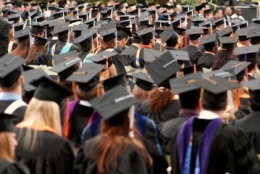15 March 2013
 More than 5000 University of South Australia students will have their degrees conferred in March when the University holds its graduation ceremonies for the full week of March 18 to 22.
More than 5000 University of South Australia students will have their degrees conferred in March when the University holds its graduation ceremonies for the full week of March 18 to 22.
University of South Australia, Vice Chancellor Professor David Lloyd says the throng of students wearing caps and gowns around North Terrace are as important to the state’s sense of success and opportunity as cranes on the skyline.
“People often use the crane analogy as a symbol of a go-ahead economy, but the graduation of 5000 or more students is an equally significant measure of our future development and prosperity,” Prof Lloyd says.
“Our graduates are work-ready and I think the fact that the Good Universities Guide shows that UniSA has the best employment outcomes in the State for its graduates is testament to that.
“For each student, graduations are a personal milestone, for the state they are a measure of the talent, skills and potential of our community.”
He says more than 620 students will graduate from UniSA with education degrees, with over 700 in nursing and midwifery and more than 330 in the field of engineering.
As this is the first graduation for the newly appointed Vice Chancellor, Prof Lloyd will be welcomed with a special Kaurna “ceremonial welcome to country” on Thursday March 21.
The ceremony will mark the first time a Vice Chancellor has been welcomed to South Australian lands by the traditional owners at a university graduation ceremony.
UniSA’s Dean Indigenous Scholarship, Engagement and Research, Professor Peter Buckskin says the welcome has special significance because, being from Ireland, the Vice Chancellor is completely new to Australia.
“The ceremony acknowledges that, as the traditional owners of the land, our ceremonial welcome is valued and that the University has a respect for and commitment to Indigenous protocols and knowledge,” Prof Buckskin says.
“UniSA has a long and proud tradition of supporting Indigenous education and this welcome, which the Vice Chancellor is delighted to be receiving, is a sign that the commitment to Indigenous opportunity remains strong at UniSA.”
Prof Lloyd says the ceremonial welcome is a great honour, coming as it does from people who have the oldest living culture on the planet.
“I’m excited and honoured to be a part of this and keen to broaden my knowledge of Indigenous culture and history but also to better understand what we can do as educators to improve the lives of Indigenous children today,” he says.
He says universities have a role that goes beyond teaching and research.
“I firmly believe the university experience should act to inspire graduates to make a positive contribution to the world,” he says.
“What we hope for is that our students will have learned enough and experienced enough at university to take their place as valuable citizens in the world – to become the people who innovate, who take risks to achieve great things and who work with purpose and passion to make a difference to society,” he says.
“The one thing I want to get across to our graduates is that we’re proud to have had them study with us and we hope they will continue to feel an attachment and engagement with the UniSA community, no matter where they are in the world.”
Highlights of the week-long graduation celebrations include the presentation of Honorary Doctorates to legal expert and human rights advocate, UniSA’s Adjunct Professor Robyn Layton, AO QC and renown visual artist and former UniSA lecturer, Sydney Ball.
A full list of the graduations timetable is available online.
Media contact
Michèle Nardelli office: 08 8302 0966 mobile: 0418 823 673 email: michele.nardelli@unisa.edu.au




